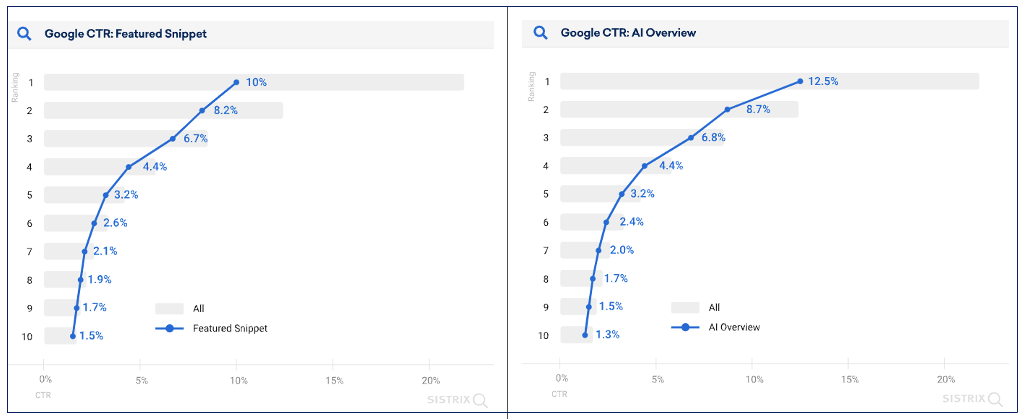AIO CTR, Google Nostalgia, Pre-Fulfillment Reviews

AIOs: More Clicks than Snippets
Google has repeatedly claimed searchers are responding positively to AI Overviews (AIOs) and that they're driving more engagement and clicks than if they weren't present. Search marketers have rightly been skeptical of these claims. Now a report from Sistrix, looking exclusively at UK traffic, seems to support some of what Google is claiming – but it's qualified. Sistrix compared Featured Snippets and AIO click-throughs (CTRs). Roughly 75% of AIOs contain between 4 and 7 links according to the report. As the charts below indicate, AI Overviews have a higher CTR in the top two positions. In position one, the AI Overview has a 12.5% CTR vs. 10% for the Snippet. In Position 2, AIOs had an 8.7% CTR, whereas Snippets had 8.2%. In the lower positions, however, CTRs are comparable or the Snippet has a slightly higher CTR. The practical advice: beef up E-E-A-T and authentic content and build a brand. Consumers favor brands and so does Google.

Our take:
- Google is using "curated" and trusted sources in AIOs to make them more authoritative and deal with inaccuracy, which plagued them early on.
- It's also starting to embed links in anchor text in its AIOs. That will likely drive more clicks for prominent links.
- There's plenty of advice about being included in AIOs (e.g., seoClarity). Partly it involves SEO best practices and partly it's about building a brand.
Google Nostalgia Kicking In
Google is very far from being dethroned as the king of search. But there's some handwringing starting to happen among people who can see AI search gaining traction. An article in the The MIT Technology Review worries about about the prospect of AI eliminating the need to click through to publisher websites and the corresponding disruption of their business models. People have talked about something similar with Google AI Overviews (AIOs) since the launch of SGE, but see the item above. Now, a new piece in The Atlantic argues that the convenience and time savings of AI search results are actually a bad thing. The author says that AI search can be inaccurate and, at best, promote only a superficial understanding of topics. The point is to avoid clicks to original sources, he contends; adding, they also diminish user experiences by limiting content exploration. What's more, they're antidemocratic, by further consolidating control of information in a few corporate hands. There's almost a wistful, nostalgic quality to the critique.

Our take:
- Many of the points made in The Atlantic piece have merit. However Google has been in control for too long. It needs true competitors.
- Google is committed to AIOs and publishers have to get used to a search landscape that's changing. Build your brand, use other channels.
- For informational queries AI can offer better outcomes and significant time savings. Plus the competition will (hopefully) make Google better.
'Pre-Fulfillment' Review Scheme Busted
Product review site Sitejabber, which has been around for 17 years and claims it's backed by the National Science Foundation, was accused by the FTC of consumer deception by capturing product reviews before customers had received the products (or services) they had bought. The FTC and Sitejabber have now entered into a consent decree that prohibits Sitejabber from misrepresenting that its reviews come from people who've actually used the products in question, if they haven't. Sitejabber apparently solicited "pre-fulfillment" ratings immediately after consumer purchases but before they received the items. It also encouraged people to leave 5-star reviews in the process. And it syndicated these reviews to third party review sites. Sitejabber monetizes with a review and reputation management product that includes review solicitation. This now prohibited solicitation methodology was likely aimed an improving its clients' ratings.

Our take:
- What Sitjabber was doing is not very different from other review solicitation strategies online.
- Many review sites, including Amazon, solicit reviews relatively quickly after purchase. There may be not enough product experience to deliver a real verdict, hence: "works great so far."
- Previous research argues the best time to ask for reviews is not within 24 hours of a transaction but later on.
Recent Analysis
- Siri Finally Gets Local Search, by Mike Blumenthal.
- Near Memo episode 182: A Google “pardon”?, Siri’s search improvements, search from ChatGPT is really good.
Short Takes
- Local SEO tips for SABs and businesses with storefronts.
- Google releases November Core Search Update.
- Firefox is 20; how will Mozilla jumpstart growth?
- More screen-controlling LLMs are coming (Apple, MSFT).
- New rich markup travel ads may be rolling out.
- How might a Google breakup change PPC? (probably not happening).
- Rivals Ecosia and Qwant are teaming up to create new search index.
- Apple’s Find My lets users share lost item locations with others.
- Google and UK's CMA continue to spar over the G's Privacy Sandbox.
- EU doesn't like Apple "geo-blocking" in different European countries.
- Under pressure, Meta brings down "no ads" subscription price in Europe.
Listen to our latest podcast.

How can we make this better? Email us with suggestions and recommendations.

